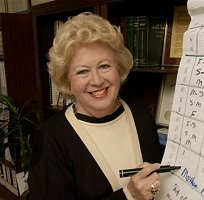MY STYLE OF MEDIATION
I employ, to every extent possible, facilitative mediation. Now that I’ve said it, what is it? Let’s take a look at mediation 101.
There are various forms of conflict resolutions processes that are alternatives to litigation. It has been suggested that what we call "ADR," Alternate Dispute Resolution, may best be termed Appropriate Dispute Resolution, allowing the disputant to pick an ADR process most appropriate for his needs. Some choices are mediation, arbitration, early neutral evaluation, judicial settlement conferences, Aunt Susie’s Wisdom, etc.
Likewise, there are various forms of mediation of which the prospective mediation client should be aware. Generally, mediation pros talk about "hashers" versus "bashers". As the words explain, some mediators allow the parties to hash out the terms of an agreement at their own speed; some bash the clients into resolution. These mediators are often called "muscle" mediators. Mediators getting agreements is like adding another notch on your gun handle. And some judges and attorneys like this because it moves the case off the docket and closes the file short of trial.
Other dichotomous descriptive words regarding mediation styles are:
Shuttle versus Facilitative
Transformative versus Evaluative
The trick or talent of the experienced mediator is to know what style to use when.
Shuttle mediation is a process whereby the mediator, after meeting the parties and allowing each’s attorney to make an opening statement, divides the parties into different rooms and shuttles from one to the other taking messages (proposals) from one side to the other. The mediator keeps the opponents informed of movement of one side or the other toward resolution.
I prefer the facilitative method, facilitating negotiations between the parties face to face rather than exclusively shuttling back and forth between separated parties. Clients report they feel more involved in the decision-making process, each having had a chance to be heard. Facilitative mediation hastens trust of the mediator; there is less wondering and worrying what’s being said in the other room.
In facilitative mediation, each client gets to tell his or her story to the other. Options for possible resolution get listed (I use a flip since I don’t know if the person sitting in front of me is a right brain or left brain learner), discussed, and chosen. And yes, this process allows each disputant to observe just how each may be perceived by a judge or jury. Facilitative mediators may meet in private sessions with each side to go through a specific process that helps the attorney chart and evaluate the case for the client.
Transformative mediation, which uses the facilitative method, is more concerned with the process of conflict resolution than the resolution itself. This is often contrasted with evaluative mediation that is so "resolution focused" you may see the mediator evaluating the case for each side and then telling them how they ought to settle. There is a form of ADR called Early Neutral Evaluation that does just that. Employing empowerment and recognition as techniques, transformative mediation hopes to transform the clients from angry, self- centered, win/lose positioned disputants to cooperative, acknowledging, now and future focused, responsible ones. And maybe even get to resolution. It allows a lot of leeway for the clients to frame the issues and the discussion. Transformative mediators use the facilitative style. Thus, should the clients not resolve all issues in that mediation session, the likelihood of them being able to do so before resorting to litigation is high. According to Professor Robert Baruch Bush of Hosta University and his co-author Joseph Folger in their book, The Promise of Mediation , the mediation process should promise something more to the client than just closing the file.
Perhaps my style is best described by Professor/attorney/mediator David Hoffman in his article "Confessions of a Problem-Solving Mediator" in the 1999 Volume 23 Number 3 newsletter of the Society of Professional in Dispute Resolution. He contrasted transformative mediation with problem solving and suggested we experienced mediators intuitively engage techniques that fall somewhere in between.
Again, the trick and talent of the experienced mediator is to know what style to use -- and when.
Certification of mediation specialist is not currently available in Tennessee. Approved by the Tennessee Supreme Court’s Alternate Dispute Commission under its Rule 31 for civil law and family law cases.

